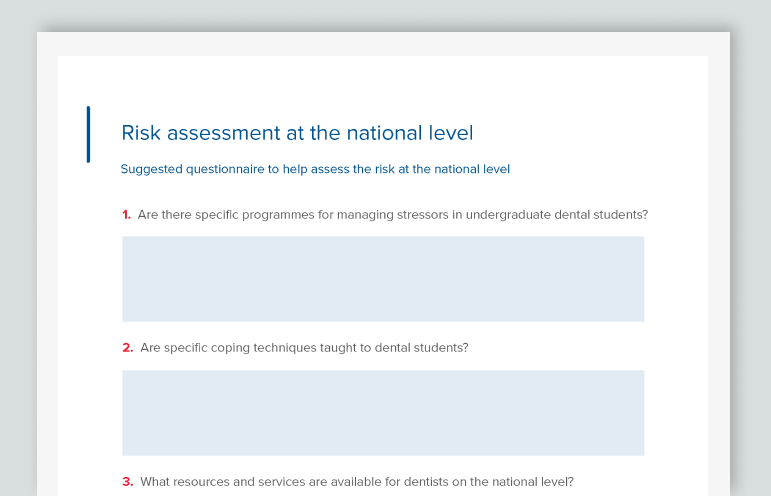Below you will find recommendations to help assess well-being on the National Level.
National level
Determine
Determine: How is well-being taught, managed, and supported on the national level?
01 Step one
How is well-being taught, managed, and supported on the national level?
It is important to have a specific policy in place pertaining to the mental health and well-being of dental health professionals within a national framework. It should clearly communicate priorities and any key actions that will be taken to improve well-being, the resources dedicated to each action, and the key outcomes and targets it intends to achieve.
Below is a table specifying four points that should be evaluated at the national level.
Inclusion of well-being and stress management in the university dental curriculum
- Identify strategies used to help stressed dental students
Training in stress management for qualified dentists and dental healthcare professionals at a national level
- Identify training programmes available for dentists on the national or regional level
Production of resources to support the dental team
- Identify resources available for dentists on the national and international level
- Identify research which is underway on the national or regional level
Support services for dentists with more severe impacts
- Identify services available for dentists on the national and international level (i.e., health services, alcohol and drugs consumption and other issues)
Mental health national survey
National surveys have the potential to build a picture of a country’s situation. National mental health surveys for healthcare workers will provide authorities with the information to assess the situation, providing national solutions that will result in appropriate delivery of healthcare to the population.
A national survey for oral healthcare workers should evaluate the scope of the problem and prevalence of mental health issues. Additionally, national authorities should consider the following factors:
Salaries/ financial issues
National regulations
Number of practitioners
Availability of equipment
Mentorship
Scope of practice of dental nurses, hygienist and assistants
Mental health, clinic management and communication strategies in dental curriculum
Employment legislation and flexible working
Gender issues and attitudes
Note: Find examples of National Surveys in the Additional Resources.


